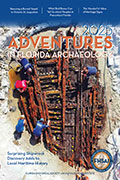Surabhi Adesh was born in Bareilly, Uttar Pradesh, India, in 1965. Her father received a position with the Indian High Commission to teach Hindi music and culture in the West Indies and report on the broader conditions of the Indian diaspora in that region. As a result, in 1966, when Surabhi was around a year old, the family moved to Trinidad. In 1967, her father established the Bharatiya Vidya Sansthhaan Institute, also known as the Institute of Indian Knowledge, with a mission to reacquaint the Indian diaspora in Trinidad with Hindi culture through music, philosophy, and history. At eleven years old, Surabhi assisted her father in the Institute, teaching musical classes. In 1981, Surabhi and her family moved to Toronto, Canada, to expand the Institute's reach, highlighting the contributions they made in that region and the similarities and differences encountered while engaging with the Indian community in both areas. Surabhi also discussed her personal experiences through that comparative lens between both places. Financial difficulties prompted Surabhi and her family to relocate from Toronto to Orlando, Florida, in 1999. Upon arrival, Surabhi maintained her father’s legacy of teaching Indian music and knowledge through classes she held mainly at her house. Her involvement with the Asian Cultural Association facilitated this educational endeavor. Surabhi discussed her performances throughout Orlando, her teaching methods, her impact on the Indian community in Orlando, and what she learned about Indians and Orlando through her teaching career. Additionally, she highlighted the significance of maintaining Indian culture, both generally and specifically, through her pedagogy, especially in the face of what she called a “dilution” of culture generationally. Lastly, she shared her broader observations about Florida, including the state’s continuities and changes over the past quarter-century, as well as the challenges it faces in the contemporary moment (c. 2025).







